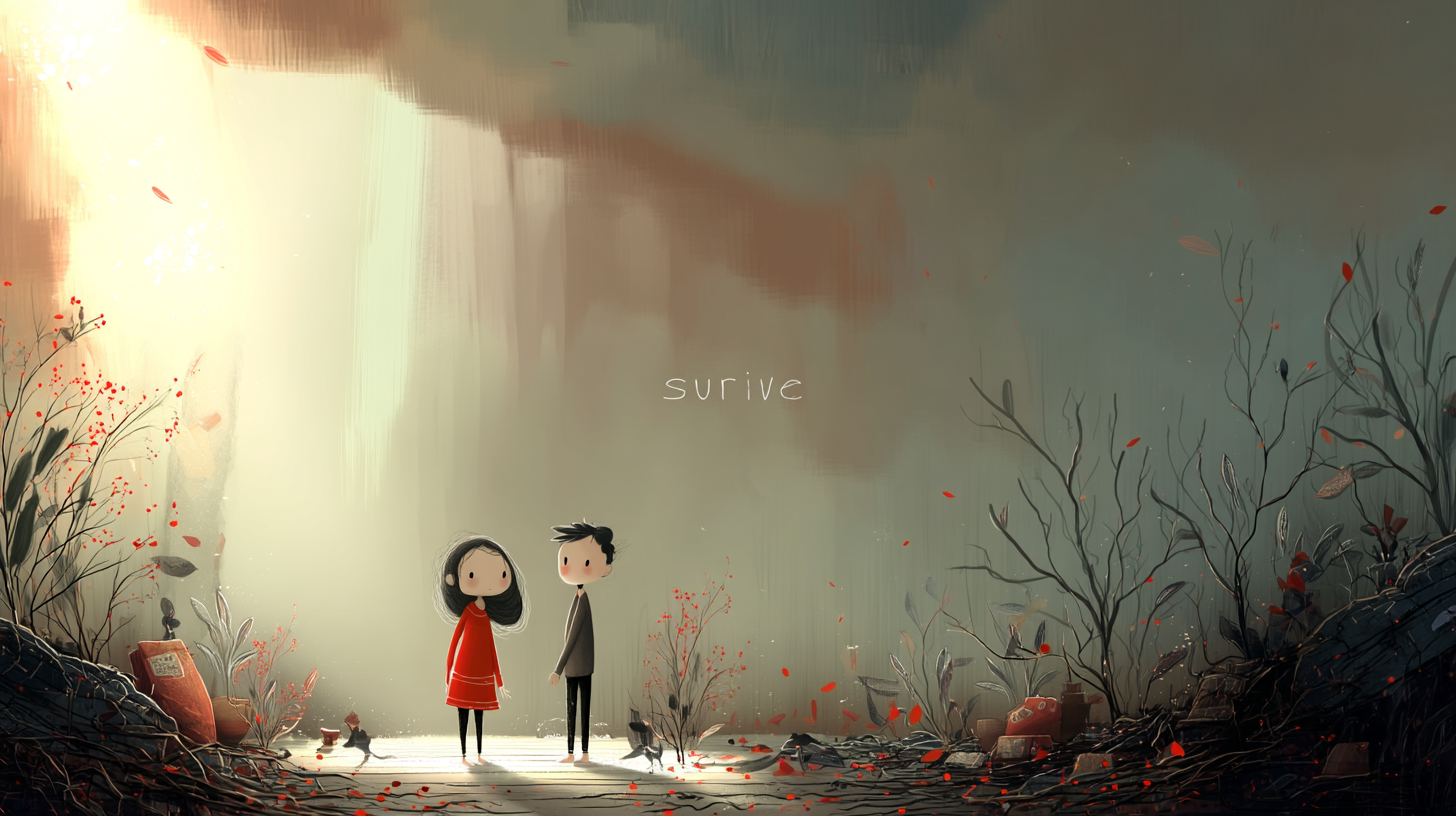“Survive” means to stay alive even when something dangerous or hard happens.
「survive」は、むずかしい状況の中で死なずに生きつづけること。
以下は英単語 “survive” に関するストーリー型学習コンテンツです。まずは大枠の意味を理解して最後の文章で確認しましょう。
主な意味(main meaning)
| 品詞 | 意味 | 発音記号 | 例文 |
|---|---|---|---|
| 動詞 (verb) | 生き残る、耐える | /sərˈvaɪv/ | She survived the car accident without any injuries. |
語源(etymology)
「survive」はラテン語 supervivere(super=超えて、vivere=生きる)から来ており、「困難を超えて生きる」というイメージをもつ単語です。
類義語(synonyms)
| 類義語 | 例文 |
|---|---|
| endure | The hikers endured the freezing temperatures. |
| persist | He persisted despite many challenges. |
| outlast | The old tree outlasted the storm. |
| withstand | This bridge can withstand strong winds. |
| continue | Life must continue even after hard times. |
反義語(antonyms)
| 反義語 | 例文 |
|---|---|
| perish | Many animals perished in the wildfire. |
| die | Sadly, the plant died without water. |
コロケーション(collocations)
| コロケーション | 例文 |
|---|---|
| survive a disaster | Many people survived the natural disaster. |
| survive a crash | He miraculously survived the plane crash. |
| survive on little food | They had to survive on little food in the desert. |
| barely survive | The man barely survived the accident. |
| survive cancer | She was strong enough to survive cancer. |
2項表現(binomials)
| 表現 | 例文 |
|---|---|
| life and death | It was a life and death situation, but she managed to survive. |
| safe and sound | He came back from the war safe and sound. |
英語ストーリー(english story)
Title: The Day We Survived the Storm
Last summer, I went camping with my older sister in the mountains. We were excited and prepared with food, water, and a tent. However, on the second night, a big storm came. The wind howled, the rain poured, and lightning flashed across the sky.
Our tent shook, and we were scared. But we knew we had to survive the night. We held the tent poles tightly and covered ourselves with blankets. It was a long, hard night. We had to endure the cold and the fear.
By morning, the storm stopped. Trees had fallen, and the ground was wet, but we were safe. We had persisted through the danger. A ranger came later and said, “You did well to withstand that storm.”
We returned home safe and sound. Everyone was surprised that we had survived a disaster. From that day on, I knew I could be strong in hard times. Life is full of life and death moments, but if you stay calm and careful, you can survive.
和訳
タイトル:私たちが嵐を生き延びた日
去年の夏、私は姉と山にキャンプに行きました。食べ物や水、テントを準備してワクワクしていました。しかし2日目の夜、大きな嵐がやってきました。風がうなり、雨が激しく降り、稲妻が空に走りました。
テントが揺れて、とても怖かったです。でも私たちはその夜を*survive(生き延びる)しなければならないと分かっていました。テントの柱をしっかりと持ち、毛布で体を覆いました。とても長くてつらい夜でした。寒さと恐怖にendure(耐える)*しなければなりませんでした。
朝になると嵐はやみました。木が倒れ、地面は濡れていましたが、私たちは無事でした。危険な状況を*persist(がんばって続ける)して乗り越えました。後でレンジャーが来て、「あの嵐にwithstand(耐える)*できてよかったね」と言ってくれました。
私たちは*safe and sound(無事)に帰宅しました。みんな、私たちがsurvive a disaster(災害を生き延びた)ことに驚いていました。それ以来、私は困難な時でも強くいられると分かりました。人生にはlife and death(生死)*の瞬間があるけれど、落ち着いて注意すれば、きっと生き延びられます。
Q&A
「survive」と「endure」の違いは何ですか?
「survive(生き残る)」は、命の危険がある状況から実際に生き延びることを指します。一方、「endure(耐える)」は、命にかかわるかどうかに関係なく、つらい状況や痛み・困難に我慢して耐え続けることを意味します。
例:極寒の夜をendure(耐える)ことはできても、survive(生き残れる)とは限りません。
「survive」と「persist」の違いは何ですか?
「persist(やり続ける)」は、困難な状況でもあきらめずに行動や努力を続けることを意味します。「survive」は命が助かるという結果に注目しますが、「persist」は努力を続ける行為自体に焦点があります。
例:病気と闘いながらも、治療をpersist(続ける)ことで、最終的にsurvive(生き残る)ことができる場合もあります。
「survive」と「outlast」の違いは何ですか?
「outlast(〜より長く生きる・続く)」は、他の人や物よりも長く続くという意味です。「survive」は危機を乗り越えて生き残ることを意味し、比べる相手がいなくても使えますが、「outlast」は比べる対象がある場合に使います。
例:その木は嵐をsurvive(生き延びた)だけでなく、他の木よりもoutlast(長く生きた)。
「survive」と「withstand」の違いは何ですか?
「withstand(耐える)」は、物理的・精神的な圧力や衝撃などに耐えることを意味します。人間や物にも使えます。「survive」はその結果、命を落とさずに生き延びたという意味を持ちます。
例:建物は地震にwithstand(耐え)たが、住民はそれをsurvive(生き延び)た。
「survive」と「continue」の違いは何ですか?
「continue(続ける)」は、途中で止まらずに続行するという意味で、必ずしも危機や困難を含みません。「survive」は、危機的状況の中で生き残る意味が含まれます。
例:試合は雨の中でもcontinue(続行)されたが、選手たちは寒さの中をsurvive(耐えて生き延びた)。
「survive a disaster」と「barely survive」の違いは?
「survive a disaster」は災害などの大きな危機を生き延びたことを意味し、「barely survive」は「かろうじて生き延びる」という意味で、生死の境をさまよったような状態を表します。
例:彼は地震をsurvive a disaster(災害を生き延びた)が、その後の飢えの中でbarely survive(かろうじて生き延びた)。



コメント